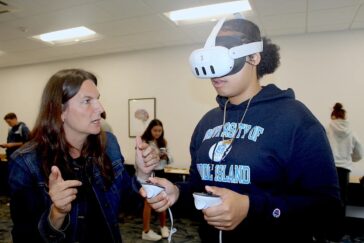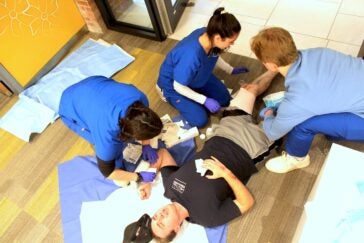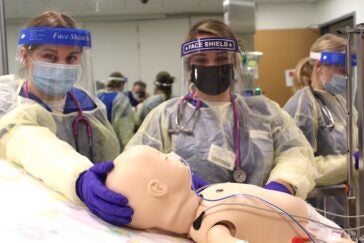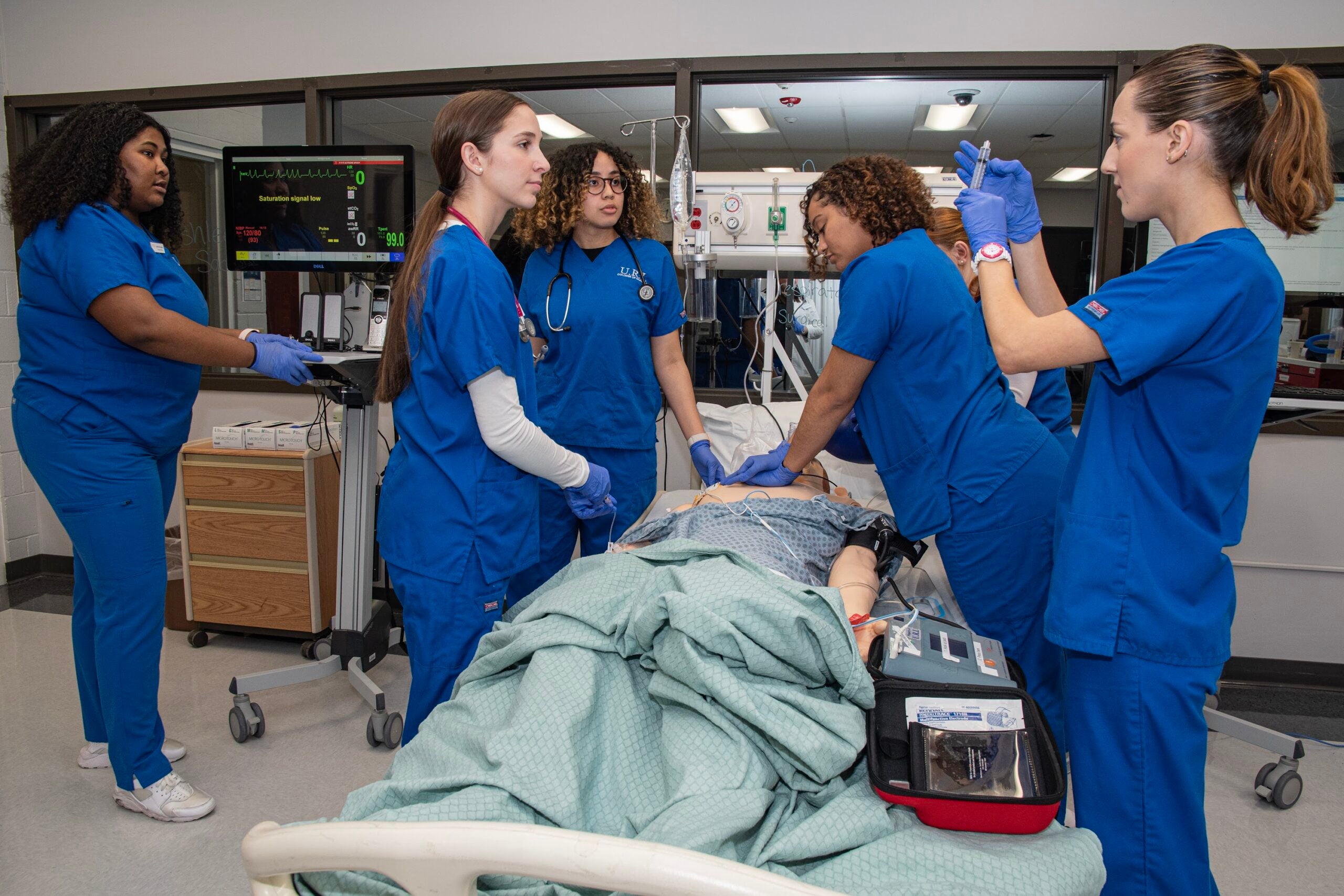Simulation program puts nursing students in realistic patient scenarios, preparing them to manage actual situations in a safe environment
The University of Rhode Island College of Nursing’s simulation education program offers students hands-on experience in a safe environment without risk to patient safety. It enhances critical thinking, teamwork, and communication skills, helping prepare future nurses to provide excellent patient care, and enhance health care in general.
The success of the program in training the next generation of health care workers has been recognized on the international level, earning accreditation for the next five years from the Society for Simulation in Healthcare, which aims to improve performance and reduce errors in patient care through the use of simulation around the world. Established in 2004 by doctors and nurses using simulation for education, testing, and research in health care, the society fosters the improvement and application of such programs, including human patient simulators, virtual reality, and standardized patients.
 “This is the gold standard for simulation evaluation,” said Jessica Skalstis, simulation coordinator for the college. “Having this accreditation helps recruit students and faculty members, and even may help enhance funding opportunities. It assures any potential funders that the program meets recognized quality standards, which in turn builds their confidence in the program’s capability to deliver the training and/or research they fund.”
“This is the gold standard for simulation evaluation,” said Jessica Skalstis, simulation coordinator for the college. “Having this accreditation helps recruit students and faculty members, and even may help enhance funding opportunities. It assures any potential funders that the program meets recognized quality standards, which in turn builds their confidence in the program’s capability to deliver the training and/or research they fund.”
URI’s comprehensive program, housed both in White Hall on the Kingston Campus and at the Rhode Island Nursing Education Center in Providence, uses various techniques, tools, and scenarios to recreate real-life patient care situations in a controlled environment. The simulation labs include life-size computerized mannequins that can talk, cry, sweat and even bleed, replicating various vital signs that students must analyze, giving them hands-on practice. The college also employs live actors trained in medical simulation to portray patients, furthering students’ live experience and giving them the chance to practice direct communication with those in their care.
 The labs simulate health care in a variety of settings, including hospital rooms, a mass casualty location and in-home care. Students can even practice in the virtual world as the college recently unveiled its VR Lab, which features Oculus Quest headsets that transport students directly into a patient’s hospital room with all the equipment one would expect to find there.
The labs simulate health care in a variety of settings, including hospital rooms, a mass casualty location and in-home care. Students can even practice in the virtual world as the college recently unveiled its VR Lab, which features Oculus Quest headsets that transport students directly into a patient’s hospital room with all the equipment one would expect to find there.
“Sim allows for safe, repetitive practice, so when they find themselves in a real situation, it’s almost a reflex,” Skalstis said. “Simulation gives them a foundation to draw from, a sort of muscle memory so they’ll be able to react in a real-world situation because they’ve had exposure to it.”
Skalstis detailed the college’s simulation program in the accreditation application, providing examples of its use in the college’s wider academic plan. She detailed the various labs in both facilities, identified the four professors certified as simulation experts, and laid out the goals, policies and procedures in place to guide the program. Two representatives of the society then spent a day touring White Hall and the RINEC, interviewing students, faculty and staff members, and Dean Danny Willis to confirm the college program meets the society’s standards.
 “It’s a very comprehensive process. It takes years of putting certain policies and procedures in place so we can demonstrate we’re meeting the core standards,” Skalstis said. “Everyone in the college really stepped up to make sure we got this accreditation. This is the organization that sets international standards for sim education. A lot of people are going to look at that and realize what a comprehensive, successful sim program we have here.”
“It’s a very comprehensive process. It takes years of putting certain policies and procedures in place so we can demonstrate we’re meeting the core standards,” Skalstis said. “Everyone in the college really stepped up to make sure we got this accreditation. This is the organization that sets international standards for sim education. A lot of people are going to look at that and realize what a comprehensive, successful sim program we have here.”

